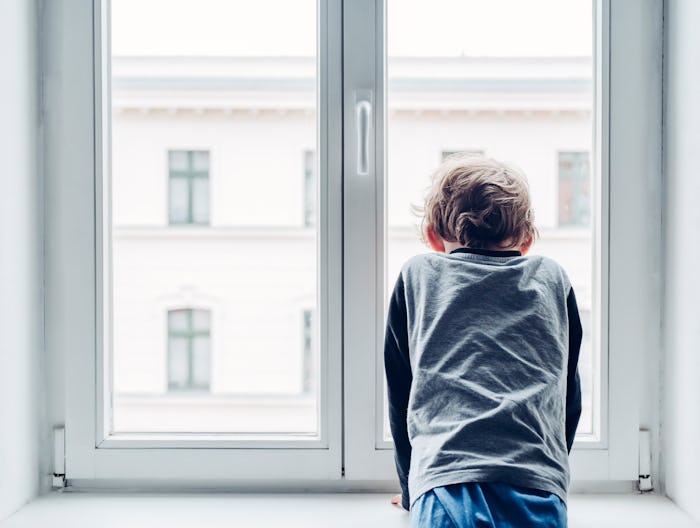Mental Health

These Are The Signs Of Depression To Watch For In Kids
They’re subtle and easy to miss, so vigilance is key.
We’ve all been kids ourselves, so we understand all too well the normal highs and lows that come with growing up. Now, as parents, we are tasked with figuring out if/when those normal lows cross over into signs of depression in kids. Negative feelings are often very difficult for kids to talk about and they may even be unwilling to discuss them at all, which makes deciphering whether or not they’re experiencing depression all the more challenging for parents.
“It is important to remember that mental health is as important as physical health,” licensed mental health counselor and registered play therapist-supervisor Andrea Vargas, LMHC, RPT-S, tells Romper in an email. “Children are seen for a physical exam yearly but we need to check on their mental health as well,” Vargas explains, so that we can identify and treat things like depression early. In order to alert your pediatrician or another healthcare professional of any concerns, though, you need to know what to look for in your child.
Depression In Pre-School Children
Parents of preschool children can mostly rest easy because clinical depression isn’t very common in this age group. “We don’t tend to see a lot of depression in very young children,” clinical psychologist Venus Mahmoodi, PhD, tells Romper in an email, “It’s quite rare in this population.” However, she notes the caveat to this is with kids who have experienced some kind of trauma. In this case, she says signs of depression will be present when they’re with friends, at school, and at home, and can include:
- Withdrawal/isolation
- Stomach aches or headaches
- Refusal or disinterest in participating in activities
Vargas notes additional signs parents should be on the lookout for include:
- Increased crying
- Irritability
- Low energy
- Disinterest in playing with friends or being around peers
- Skill and/or behavior regression; temper tantrums
- Difficulty sleeping
Depression In Elementary School Children
Signs of depression in elementary school children can vary significantly based on their age. Kindergarteners may show signs that are more similar to preschoolers whereas third-graders likely won’t be throwing tantrums, but might show more social signs. Vargas says parents should lookout for the following:
- Irritability
- Crying easily/sensitivity
- Negative self-talk
- Changes in appetite
- Sleep changes
- Drop in grades
- Lack of motivation
- Disinterest in playing with friends
- Fatigue
Other symptoms that are common in kids between six and eight years old, according to the peer-reviewed journal, Mental Health Clinician, include:
- Trouble verbalizing feelings
- Physical complaints; headaches, stomach aches, etc.
- Observed inability to find pleasure in things they used to enjoy
Symptoms included in Mental Health Clinician for kids between ages nine and 12 years old:
- Low self-esteem
- Hopelessness
- Increased boredom
- Wanting to run away
Depression In Middle School Children
“Once kids get closer to puberty, depression rates tend to increase, especially in girls,” explains Dr. Mahmoodi, so parents should be on higher alert at this point. This can be an extremely difficult age to monitor for depression, though, because tweens tend to be more emotional, are naturally more self-conscious, and are more influenced by their peers. That being said, here are some behaviors Mental Health Clinician report may be signs of depression in kids as young as 13 years old:
- Increased irritability
- Impulsivity
- Obvious behavior changes
- Drop in grades and/or poor school performance
- Change in sleep habits
- Change in eating habits
Additionally, this paper notes that throughout the teen years, signs of depression will start to look more like those of adults, including thoughts of suicide.
Depression In High School Children
Similar to tween-age kids, high school-age children are still experiencing natural emotional peaks and valleys on a regular basis, tend to hang out in their bedrooms a lot, and are not always willing to talk about their personal lives with their parents (even if they have a great relationship). Because of this, it may be more difficult for parents to sense whether or not their teen’s behaviors are just part of their age or if it’s something more.
Some things Vargas notes could be symptoms of depression are:
- Irritability; moody and/or anger outbursts
- Lack of motivation
- Fatigue
- Disinterest in activities they used to enjoy
- Poor hygiene
- Withdrawn/isolating; staying in their room more than normal, not wanting to socialize with friends
- Changes in appetite; increased or decreased
- Changes in sleep; increased sleeping, difficulty sleeping
- Drop in grades
Since teens are notorious for keeping their personal life very private from their parents, you may need to rely on their doctor for some help. “Pediatricians will usually give older kids a depression questionnaire and make appropriate referrals,” says Vargas.
What To Do
If you notice a change in your child’s behavior, resist the urge to jump right to a mental health diagnosis. Vargas advises parents to work with their child’s pediatrician to rule out side effects of medications or other possible medical issues. She also suggests parents regularly talk to their children and try to spend one-on-one time with them. Even if they resist, showing your child that you’re there for them will let them know that they can trust you. Finally, Vargas says parents should seek out professional help/counseling for their child if they suspect they’re suffering from depression.
Experts:
Venus Mahmoodi, PhD, Adjunct Faculty and Affiliate Scholar, Teachers College, Columbia University and Clinical Psychologist, Khalil Center
Andrea Vargas, LMHC, RPT-S, Licensed Mental Health Counselor and Registered Play Therapist-Supervisor
Sources:
Sandra Mullen “Major depressive order in children and adolescents,” The Mental Health Clinician, 2018 https://www.ncbi.nlm.nih.gov/pmc/articles/PMC6213890/